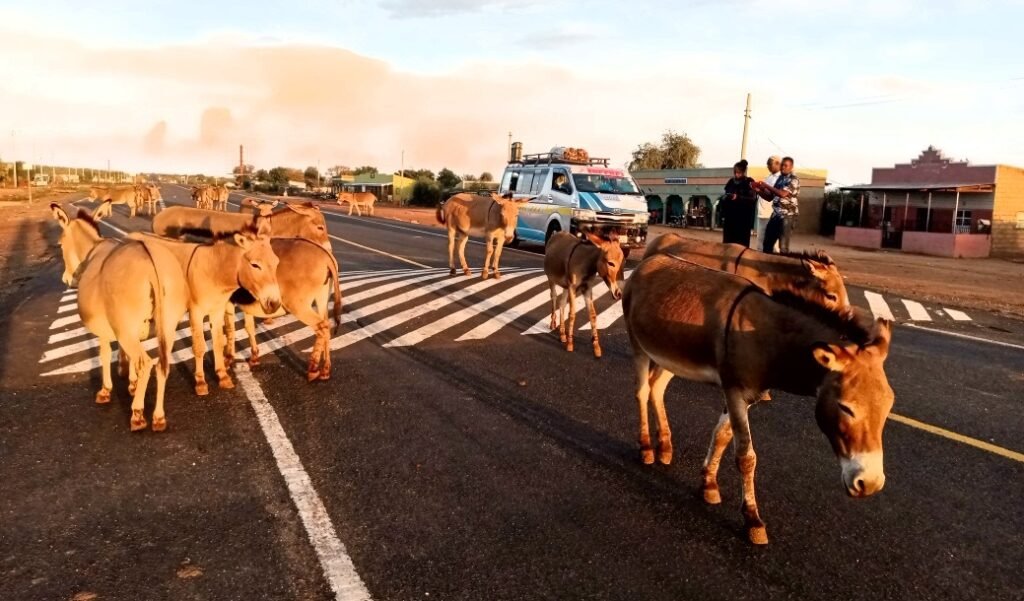By Sebastian Miriti
An alarm has been raised over the rampant stealing and bush slaughter of donkeys for their skin, despite a ban on the practice, posing a major concern in the country.
As a result, there have been calls for the government to address the legal loopholes that facilitate this illegal practice, which not only endangers the existence of donkeys but also exposes the public to health risks.
A media sensitization and consultative workshop organized by the Africa Network for Animal Welfare (ANAW) in conjunction with Weltierschutzgesellschaft (WTG) from Germany, recently held in Moyale town, disclosed that about 10,000 donkey skins were exported to China last year despite a ban on the same by the government.
Dr Dennis Bahati, a program officer at ANAW, highlighted the escalating bush slaughter of donkeys across the country, particularly in Kajiado, Nakuru, Kiambu, and Naivasha. This slaughter is primarily driven by the demand for their skins in China, where it is prized for its valuable ejiao, a traditional remedy.
While hailing the revocation of export licenses issued to companies that operated donkey slaughterhouses locally, he emphasised the urgent necessity of formulating laws to align with the African Union Assembly moratorium adopted in February 2024.
At the extraordinary session in Addis Ababa, the heads of state and government agreed to halt the horrific donkey skin trade on the continent.
Dr Bahati informed the forum, which brought journalists from Isiolo and Marsabit counties, and the Moyale Donkey Welfare Association, that besides decimating the donkey population, the bush slaughter poses a health hazard as the meat, falsely labeled as beef, often enters the supply chain after inspection.
The number of donkeys has been dwindling at an alarming rate, reducing to slightly above half a million from a staggering figure of 1.8 million as captured during the 2009 national population and housing census.
The participants were in agreement that careless abandonment of donkey carcasses in the bush was an environmental danger, as they pollute water sources and expose nearby schools and homesteads to awful smells.
It is also feared that unless stopped, cross border movement and theft of these animals could easily compromise on the gains the government has made in taming the thorny menace of rustling of livestock in pastoralist areas.
Ms Hawo Huka Gullied, the treasurer of the local donkey welfare association described the donkey as a very precious animal which local communities especially women depend on when fetching water, wood for cooking, food and goods for trade.
“It should not be forgotten that we live in areas where conventional mode of transport is limited so we rely on this animal to transport property when we migrate in search of water and pasture” she said, adding that donkeys are used as human transport as well.
The theft and the black marketing of donkeys is emerging as a threat to the livelihoods of hundreds of households in the arid and semi-arid (ASALs) areas of the country, hence frustrating efforts being employed by the government to address issues of poverty.
Donkey smuggling
ANAW director Josiah Ojwang said that the country has of late witnessed an influx of donkeys smuggling from neighbouring countries of Tanzania, Ethiopia, Somalia, Uganda, Sudan and Southern Sudan owing to its porous borders.
“Donkeys are still considered as food animals in Kenya and a such slaughtering is allowed by law which was enacted in 1999,” he pointed out and called for a reverse of the same in order to protect the endangered animals and to safeguard human health.
The director noted that the donkey was a difficult breeder animal due to its long gestation period of 13 months, besides taking three years before coming on heat after calving.
According to the Moyale sub-county veterinary officer Hassan Nura, the menace of donkey smuggling into the country along the Kenya-Ethiopia border is rampant.
Mr Nura said that the area had since the subsiding of Covid-19 witnessed an influx of donkey traders reportedly from Naivasha and Nakuru areas.
He said that his office had in the recent past issued movement permits to the traders to transport over 4,000 donkeys who pretend that they were buying the animals for rearing in the neighbouring Isiolo county.
“We have since established that the animals are transported beyond Isiolo particularly to Naivasha and Nakuru where they are slaughtered in the bush for their skin,” he said, adding that his office could not do anything about it as movement of donkeys was permitted in the country.
The official pointed out that the illegal activities surrounding the trade in donkey skins existed because of legal gaps.
The veterinary officer observed that the consumption of donkey meat is legally acknowledged in the country, as well as the purchase and transporting of the animals around the country for domestic use is also permitted.
“As the guardian of slaughter and sale of healthy meat, we are concerned over the reports that uninspected donkey meat could be infiltrating the supply chain,” he said and urged the legislative organs at county and national level to enact laws that would assist in tackling the problem.
The media was urged to be vigilant and assist the government and other players in championing the welfare of animals and protection of human health.


